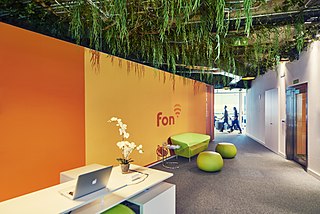
Deutsche Telekom AG is a German telecommunications company headquartered in Bonn and is the largest telecommunications provider in Europe by revenue. It was formed in 1995 when Deutsche Bundespost, a state monopoly at the time, was privatized. Since then, Deutsche Telekom has consistently featured among FortuneMagazine's top Global 500 companies by revenue, with its ranking as of 2023 at number 79. In 2023, the company was ranked 41st in the Forbes Global 2000. The company operates several subsidiaries worldwide, including the mobile communications brand T-Mobile. It is the world's fifth-largest telecommunications company by revenue.

Vodafone Group Plc is a British multinational telecommunications company. Its registered office and global headquarters are in Newbury, Berkshire, England. It predominantly operates services in Asia, Africa, Europe, and Oceania.
SimPay was a consortium which was founded to promote mobile payment in 2003 but which was closed as of June 2005. Simpay started in Spain by a number of mobile phone companies to build an open, interoperable solution, but was abandoned when key members pulled out in 2005.

BT Communications (Ireland) Limited is a telecommunications and internet company in Ireland. It is a subsidiary of BT Group plc.

Fon Wireless Ltd. is a for-profit company incorporated and registered in the United Kingdom that provides wireless services. Fon was founded in Madrid, Spain, in 2006, by Martín Varsavsky where it headquarters most of its operations.
Internet access is widely available in New Zealand, with 94% of New Zealanders having access to the internet as of January 2021. It first became accessible to university students in the country in 1989. As of June 2018, there are 1,867,000 broadband connections, of which 1,524,000 are residential and 361,000 are business or government.
The Internet country code top-level domain (ccTLD) for Italy is .it and is sponsored by Consiglio Nazionale delle Ricerche. The .eu domain is also used, as it is shared with other European Union member states.

Rich Communication Services (RCS) is a communication protocol standard between mobile telephone carriers, based on IP Multimedia Subsystem, developed and defined by the GSM Association (GSMA). It aims to be a replacement of SMS and MMS, with a text-message system that is richer and provides phonebook polling. It is also marketed as Advanced Messaging, and was previously marketed as chat features, joyn, SMSoIP, Message+, and SMS+.

Accton Technology Corporation is a Taiwanese company in the electronics industry that primarily engages in the development and manufacture of networking and communication solutions, as an original equipment manufacturer (OEM) or original design manufacturer (ODM) partner.
The Open Networking Foundation (ONF) is a non-profit operator-led consortium. It uses an open source business model aimed at promoting networking through software-defined networking (SDN) and standardizing the OpenFlow protocol and related technologies. The standards-setting and SDN-promotion group was formed out of recognition that cloud computing will blur the distinctions between computers and networks. The initiative was meant to speed innovation through simple software changes in telecommunications networks, wireless networks, data centers and other networking areas.

ip.access Limited is a multinational corporation that designs, manufactures, and markets small cells technologies and infrastructure equipment for GSM, GPRS, EDGE, 3G, 4G and 5G. The company was acquired by Mavenir in September 2020.
6WIND is a virtual networking software company delivering disaggregated and cloud-native solutions to CSPs and enterprises globally. The company is privately held and headquartered in the West Paris area, in Montigny-le-Bretonneux. 6WIND has a global presence with offices in the US and APAC. The company provides virtualized networking software which is deployed in bare-metal or in virtual machines on COTS servers in public & private clouds. Their solutions are disaggregated and containerized based on the cloud-native architecture.
The Data Plane Development Kit (DPDK) is an open source software project managed by the Linux Foundation. It provides a set of data plane libraries and network interface controller polling-mode drivers for offloading TCP packet processing from the operating system kernel to processes running in user space. This offloading achieves higher computing efficiency and higher packet throughput than is possible using the interrupt-driven processing provided in the kernel.

Mavenir Systems, Inc. is an American telecommunications software company, created in 2017 as a result of a three-way merger of existing companies and technologies, that develops and supplies cloud-native software to the communications service provider (CSP) market.
Enhanced Voice Services (EVS) is a superwideband speech audio coding standard that was developed for VoLTE and VoNR. It offers up to 20 kHz audio bandwidth and has high robustness to delay jitter and packet losses due to its channel aware coding and improved packet loss concealment. It has been developed in 3GPP and is described in 3GPP TS 26.441. The application areas of EVS consist of improved telephony and teleconferencing, audiovisual conferencing services, and streaming audio. Source code of both decoder and encoder in ANSI C is available as 3GPP TS 26.442 and is being updated regularly. Samsung uses the term HD+ when doing a call using EVS.
Telxius Telecom S.A. is a global telecommunications infrastructure company created in 2016, owned by Telefónica Infra, a subsidiary of Spanish telecommunications company Telefónica.
Altiostar is a company that provides open virtual radio access network (vRAN) technology. The company is headquartered just outside of Boston, Massachusetts, with offices in Japan, Italy, the U.K., Mexico and India. The company is a subsidiary of Rakuten. Founded in 2011 by President and CEO, Ashraf Dahod, Altiostar is focused on open, virtual RAN software that they claim can integrate operation of equipment from multiple vendors.
Tejas Networks is an optical, broadband and data networking products company based in India. The company designs develops and sells its products to telecom service providers, internet service providers, utilities, security and government entities in 75 countries. The company has built many IPs in multiple areas of telecom networking and has emerged as an exporter to other developing countries including Southeast Asia and Africa.








